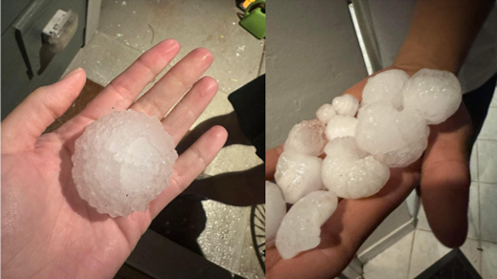Self-appointed insurance industry spokesperson, the very capable attorney Steve Badger, made the following comment about Monday’s Colorado Supreme Court decision:
A very unfortunate outcome-oriented decision today out of the Colorado Supreme Court applying the notice-prejudice rule to property insurance policies despite the policies having a one year notice of claim requirement. Faced with such a simple and clear policy requirement, the court had to engage in some pretty strenuous mental gymnastics — including equating homeowners with hail claims to tort victims and completely conflating liability coverage principles with property coverage principles — to get to its desired result. A strong dissent gets it right. The contract should be applied as written and agreed. In Texas, we have strong Fifth Circuit decision that gets it right — a one year notice of claim requirement establishes a specific deadline for notice. Period. End of the analysis.
Sadly, this decision will just lead to more trolling by Colorado roofing contractors long after a storm has passed looking for potential claims involving roofs that likely weren’t even in the path of the storm. With such conduct raising the possibility, as the dissent properly predicted, of ‘destabilizing Colorado insurance markets.’ Notably, the decision was limited only to residential claims. A strong argument can be made that the policy reasons supporting the court’s decision do not apply in the commercial insurance context.
I was concerned that Steve was actually “sad” about this predictable outcome since it is how most states view the legal late notice issue. So, I researched the personal issue and found this:
Badgers are closely related to weasel personalities and share the same range as their cousins the skunks. What distinguishes badgers from their relatives is their extraordinary physical and emotional strength and tenacious approach to life’s challenges. Good looking, small to medium sized individuals, they walk and talk as if they own the world and their powerfully built bodies and dominating personalities back down for none, even for the much larger personality of the lion. Badgers will confidently enter the territory of others and woe betide anyone who blocks their path.1
Seems like the perfect description of my “good looking” and “dominating” personality opposing colleague. He is just not going to give up after losing. He is further suggesting that when John Jones, the homeowner, goes into his business, John becomes instantly sophisticated. Those badgers should know that their skunk cousins do not become more sophisticated just because they are called by a different name when they leave home.
For those who are not aware of the legal issue, I suggest you read Matt Stalcup and Jon Bukowski’s article, Colorado Supreme Court: Late Notice, No Prejudice, No Problem, which summarized the Colorado holding:
[T]he Colorado Supreme Court extended the notice-prejudice rule to occurrence-based, first-party homeowner property insurance policies. This opinion now requires Colorado insurers to show actual prejudice from delayed notice before denying coverage. No longer can Colorado insurance carriers deny coverage for claims based solely on a policyholder’s failure to provide timely notice without demonstrating that the delay prejudiced the insurer’s ability to investigate or defend against the claim.
Three years ago, I wrote, “Should Late Notice of Windstorm and Hail Claims Be a Valid Defense When the Insurer Is Not Prejudiced?” The article noted that the Arkansas Department of Insurance position is that a wind and hail claim reported later than 365 days after the date of loss can be denied based on a policy provision that requires a claim be reported within such time but that the policyholder must be provided the opportunity to rebut the denial by showing that there was good cause for the delay in reporting. I made up this common scenario, which is repeated thousands of times to insurance companies with hail damage allegedly reported late:
Adjuster—“Lady, why did you wait 20 months to report your hail damage?”
Policyholder—“I did not know that hail damaged my roof.”
Adjuster—“Did you know there was a hailstorm?”
Policyholder—“You hear and see hail whenever, but how do you know it caused any damage? It’s not like an airplane smashed through my living room, leaving a hole in the roof that anybody could see.”
Adjuster—-“So, how do you know this particular hailstorm caused the damage? Could it have happened three years ago?”
Policyholder—“Well, I saw that my neighbors started getting roofing companies on their roofs all about the same time a little more than a year ago or so. One of them at the shopping center told me hail had damaged her roof. That is why I called my insurance agent.”
Adjuster—“So, you noticed your neighbors getting work on their roofs, but you never inspected your own roof?
Policyholder—“How would you expect me to do that? And why would I? It was not leaking!”
Adjuster—“So it is not leaking now?”
Policyholder—“No, you moron. If it were leaking, I would have told you that was the reason I reported the claim to the agent. Anybody could have put two and two together and figured that the hail damaged my roof at the same time my neighbors were getting their roofs fixed and paid for by their insurance companies. I told you my neighbors all had their roofs getting fixed, and anybody could figure that hail does not happen at just one house like a fire; it spreads over a neighborhood. I am 67 years old and do not climb a ladder inspecting anything. I have never been on top of a house and never on a roof in my life. I could fall off and kill myself. Just because I am older does not mean I am stupid. You never ask me all these questions when I pay my premiums. Why don’t you get your butt up there and look at my roof?”
Adjuster—“Sorry, I did not mean to make you angry. I will send out an expert roof engineer from HAAG or Rimkus right away. They will know just what to do.”
Those of us in the policyholder representation business and in Steve Badger’s insurance defense business know that HAAG and Rimkus should get cases of champagne from us at Christmastime. They always find reasons for the insurance company to deny the claim and start litigation. Good ole Steve Badger and Zelle Law are crying with a smile all the way to the bank after the ruling from the Colorado Supreme Court.
I know some of you are wondering what the heck the title of this post means. “The Doom and Gloom Assumes a Costume of Plume” metaphorically suggests that what begins as a difficult, perhaps disheartening situation (doom and gloom), transforms into something to be proud of, signifying success, achievement, or a positive resolution (costume of plume). In the context of insurance and legal disputes, this phrase should be interpreted to mean that even the most challenging or hopeless cases can be turned around, leading to outcomes that are not only favorable but also worthy of celebration and pride. Our firm is constantly in this situation when first presented cases from clients. My hope is that Steve Badger and his friends in the insurance industry will see that the lady in my hypothetical scenario receives what she should have been entitled to if she reported the loss right away. That is why this Colorado case was decided correctly.
There is another aspect of the case that can lead to wrongful gamesmanship, which I will describe in an upcoming post.
Thought For The Day
Success, failure, and change are inevitable in life. It’s how we handle it, how we learn from it, and how we move forward that matters.
—Elizabeth Gilbert




